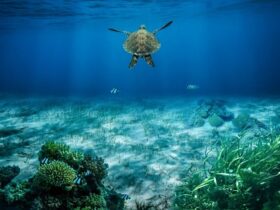Marine biology pertains to life in oceans, seas, and other saltwater bodies. It has something to do with the wide variety of marine organisms and their respective natural habitats—from the tiny plankton up to the largest blue whale. In more ways than one, marine life contributes to maintaining a healthy planet and continuing good means of sustaining humanity. Knowledge of marine biology helps us appreciate the delicate balance of underwater ecosystems and underlines the urgent need for their protection.
In this article, we’ll dive into the world of marine biology, exploring its definition, scope, and significance in today’s world. By the end, you’ll understand why this field matters and how it impacts our lives and the environment.
What is marine biology?
Marine biology can be described as the science of life in brackish areas such as oceans, seas, and coasts’ estuaries: studying behaviours, their interactions, and the connection they have to their environment. It is termed as general knowledge comprising fields in biology, chemistry, geology, and oceanography in the research on organisms in the water.
1. Marine Ecology: The field of marine biology can range in topic from coral reefs and mangrove ecosystems to deep-sea trenches—actually, anything in the ocean with unique support and maintenance of a number of species.
2. Organisms: From the tiniest of organisms known as phytoplankton through the fish and crustaceans up through the marine mammals and seabirds.
3. Ecological Relationships: Ranging from predator-prey and symbiotic relationships to nutrient cycling and many more, it all forms a part of research undertaken by marine biologists.
4. Marine Biotechnology: New medicines and material gains derived from marine organisms have a lot of advantages.relationships to.
5. Conservation and Sustainability: The establishment of human effects on marine ecosystems, coupled with mitigations against these, be they by pollution, overfishing, or as part of climate change, is all a big umbrella to place within marine biology.
Why is marine biology important?
1. Biodiversity and Ecosystem Health
80% of life on Earth is in the ocean. It is very important in maintaining ecosystem balance, food webs, and stability in global climate systems. If the health of the planet is a concern, that alone should be a good enough reason to protect marine life at all costs.
2. Climate Regulation
Oceans represent a huge sink for carbon, taking up nearly one-quarter of CO2 emissions resulting from human activities. The activities of phytoplankton and other marine life in the carbon cycle have balanced Earth’s temperature and climate.
3. Food Security
Tens of millions rely on aquatic resources for food and income. Fisheries and aquaculture create protein diets and economic activities for communities whose dwellings are at shores.
4. Medical Discoveries
Certain properties in marine life have made the discovery of new medicines possible. Compounds derived from sea sponges show their presence in some types of cancer treatments. Long ago, interfering with marine bacteria, antibiotics would not have been discovered.
5. Economic Importance
Besides fishing, tourism, shipping, and renewable sources of energy depend upon marine economies. Their conservation will give rise to sustainability in those above industries.
Problems of Marine Biology
Some of the problems attributed to marine biology include:
Climate Change: An increase in sea and ocean temperatures, ocean acidification, and the melting of polar ice caps disturb the balance within the sea’s ecosystem.
Overfishing: Types of fishing incompatible with populations and fish habitats destroy them.
Pollution: Plastic waste, oil spills, and chemical runoff are a heavy toll on marine life and their habitat.
Habitat Destruction: Other than the destructive modes of fishing, the development along coasts is seriously destroying these already fragile ecosystems of coral reefs and mangroves.
How Marine Biology Contributes to Solutions
1. Research and Surveillance
This research by marine biologists has helped in the understanding of various ecosystems that take place at given times of periods in marine ecosystems and helped through that knowledge and more to monitor the environment to allow sensible legislation by policymakers to better protect those marine environments.
2. Conservation
Everything from establishment to restoration in marine biology has served to inspire different kinds of conservational gestures or motions that go a long way to help safeguard biodiversity here.
3. Sustainable Development
It helps attain the state of attainable fishing and aquaculture methods by putting the resources to good use and hence its conservation.
4. Education and Awareness
Public awareness about the problems of marine life results in good practices for ocean care.
Careers in Marine Biology
Careers in marine biology are promising and rewarding too. Some of the common career options that include marine biology are:
Marine Scientist: Studies of organisms and ecosystems of the marine environment.
Conservationist: Protection of the marine environment and species.
Marine Biotechnologist: To find the uses for marine organisms in technology and medicine.
Environmental Consultant: to advocate for industries and governments to act and work toward becoming more sustainable.
Educator or Communicator: You teach about marine biology or do some documentation of it.
How does your contribution matter towards ocean conservation?
Here is one way through which an individual is contributing, and this is very well achievable with not necessarily a marine biologist:
1. Reduce Plastic Use: Refrain from the use of plastics, as that will only further the pollution.
2. Sustainable Seafood: Only consume those types of seafood that are caught without overfishing any particular species.
3. Cleanup Events: Participate in local cleanups of beaches or other waterways.
4. Education and Dissemination: Educate yourself about marine-related issues; share overfishing with.
5. Demand that Change Happens: Demand that these policies be brought up and stand with the organisations doing ocean preservation.
In conclusion, it is something else: incomparable, with life underwater, and actually one of the important links to health on Earth. While learning how to protect ecosystems, in fact, secures a future for times to come, not just for the benefits that store for humanity. It calls into play individual effort—or, rather, collective effort from all parts of the participation to save the beauty and variety of our oceans. ecosystems,
Let us come and learn about marine biology and try to save this blue heart for our Earth.



































Leave a Review